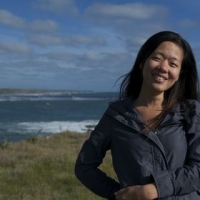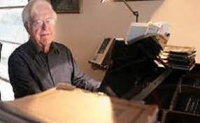Vocal Sheet Music
 "Puritanism is the haunting fear that someone, somewhere, may be happy." H. L. Menken
"Puritanism is the haunting fear that someone, somewhere, may be happy." H. L. Menken
Wicked

Wicked is a musical with songs and lyrics by Stephen Schwartz and a book by Winnie Holzman. The story is based on the best-selling novel Wicked: The Life and Times of the Wicked Witch of the West by Gregory Maguire, a parallel novel of L. Frank Baum's classic story The Wonderful Wizard of Oz from the perspective of the witches of the Land of Oz.
Wicked tells the story of Elphaba, the future Wicked Witch of the West and her relationship with Glinda, the Good Witch of the North. Their friendship struggles through their opposing personalities and viewpoints, rivalry over the same love-interest, their reactions to the Wizard's corrupt government, and, ultimately, Elphaba's public fall from grace. The plot is set mostly before Dorothy's arrival from Kansas, and includes several references to well-known scenes and dialogue in the 1939 film The Wizard of Oz.
The musical debuted on Broadway on October 30, 2003. It is produced by Universal Pictures and directed by Joe Mantello, with musical staging by Wayne Cilento. Its original stars were Idina Menzel as Elphaba, Kristin Chenoweth as Glinda, and Joel Grey as the Wizard. Although the production received mixed reviews and was panned by The New York Times, it has proved to be a favorite among patrons. The Broadway production's success spawned productions in Chicago, Los Angeles, London's West End, Tokyo, Melbourne, and Stuttgart, along with two North American tours that have visited over 30 cities in Canada and the United States.
The score of Wicked is heavily thematic, bearing in some senses more resemblance to a film score than a musical's score. While many musicals' scores develop new motifs and melodies for each song with little overlap, Schwartz integrated a handful of leitmotifs throughout the production. A cast recording of the original Broadway production was released on December 16, 2003, by Universal Music. All of the songs featured on stage are present on the recording with the exception of "The Wizard And I (Reprise)" and "The Wicked Witch of the East". The short reprise of "No One Mourns The Wicked" that opens Act II is attached to the beginning of "Thank Goodness". The music was arranged by Stephen Oremus, who was also the conductor and director, and James Lynn Abbott, with orchestrations by William David Brohn. The recording received the Grammy Award for Best Musical Show Album in 2005 and was certified platinum by the RIAA on November 30, 2006.
Wicked tells the story of Elphaba, the future Wicked Witch of the West and her relationship with Glinda, the Good Witch of the North. Their friendship struggles through their opposing personalities and viewpoints, rivalry over the same love-interest, their reactions to the Wizard's corrupt government, and, ultimately, Elphaba's public fall from grace. The plot is set mostly before Dorothy's arrival from Kansas, and includes several references to well-known scenes and dialogue in the 1939 film The Wizard of Oz.
The musical debuted on Broadway on October 30, 2003. It is produced by Universal Pictures and directed by Joe Mantello, with musical staging by Wayne Cilento. Its original stars were Idina Menzel as Elphaba, Kristin Chenoweth as Glinda, and Joel Grey as the Wizard. Although the production received mixed reviews and was panned by The New York Times, it has proved to be a favorite among patrons. The Broadway production's success spawned productions in Chicago, Los Angeles, London's West End, Tokyo, Melbourne, and Stuttgart, along with two North American tours that have visited over 30 cities in Canada and the United States.
The score of Wicked is heavily thematic, bearing in some senses more resemblance to a film score than a musical's score. While many musicals' scores develop new motifs and melodies for each song with little overlap, Schwartz integrated a handful of leitmotifs throughout the production. A cast recording of the original Broadway production was released on December 16, 2003, by Universal Music. All of the songs featured on stage are present on the recording with the exception of "The Wizard And I (Reprise)" and "The Wicked Witch of the East". The short reprise of "No One Mourns The Wicked" that opens Act II is attached to the beginning of "Thank Goodness". The music was arranged by Stephen Oremus, who was also the conductor and director, and James Lynn Abbott, with orchestrations by William David Brohn. The recording received the Grammy Award for Best Musical Show Album in 2005 and was certified platinum by the RIAA on November 30, 2006.
Joseph Kosma
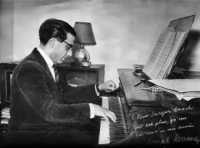
Joseph Kosma was a Hungarian-French composer. Date of birth: October 22, 1905, Budapest, Hungary Date and place of death: August 7, 1969, France
The Beatles

The Beatles were a pop and rock group from Liverpool, England formed in 1960. Primarily consisting of John Lennon (rhythm guitar, vocals), Paul McCartney (bass guitar, vocals), George Harrison (lead guitar, vocals) and Ringo Starr (drums, vocals) throughout their career, The Beatles are recognised for leading the mid-1960s musical "British Invasion" into the United States. Although their initial musical style was rooted in 1950s rock and roll and homegrown skiffle, the group explored genres ranging from Tin Pan Alley to psychedelic rock. Their clothes, styles, and statements made them trend-setters, while their growing social awareness saw their influence extend into the social and cultural revolutions of the 1960s. After the band broke up in 1970, all four members embarked upon solo careers.
The Beatles are one of the most commercially successful and critically acclaimed bands in the history of popular music, selling over a billion records internationally. In the United Kingdom, The Beatles released more than 40 different singles, albums, and EPs that reached number one, earning more number one albums (15) than any other group in UK chart history. This commercial success was repeated in many other countries; their record company, EMI, estimated that by 1985 they had sold over one billion records worldwide. According to the Recording Industry Association of America, The Beatles have sold more albums in the United States than any other band. In 2004, Rolling Stone magazine ranked The Beatles number one on its list of 100 Greatest Artists of All Time. According to that same magazine, The Beatles' innovative music and cultural impact helped define the 1960s, and their influence on pop culture is still evident today. In 2008, Billboard magazine released a list of top-selling Hot 100 artists to celebrate the chart's fiftieth anniversary; The Beatles reached #1 again.
The Beatles are one of the most commercially successful and critically acclaimed bands in the history of popular music, selling over a billion records internationally. In the United Kingdom, The Beatles released more than 40 different singles, albums, and EPs that reached number one, earning more number one albums (15) than any other group in UK chart history. This commercial success was repeated in many other countries; their record company, EMI, estimated that by 1985 they had sold over one billion records worldwide. According to the Recording Industry Association of America, The Beatles have sold more albums in the United States than any other band. In 2004, Rolling Stone magazine ranked The Beatles number one on its list of 100 Greatest Artists of All Time. According to that same magazine, The Beatles' innovative music and cultural impact helped define the 1960s, and their influence on pop culture is still evident today. In 2008, Billboard magazine released a list of top-selling Hot 100 artists to celebrate the chart's fiftieth anniversary; The Beatles reached #1 again.
Billie Holiday
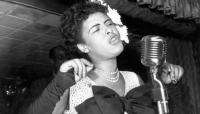
Billie Holiday, American singer, songwriter, composer. Nicknamed "Lady Day", Billie Holiday is the daughter of a traveling musician father. His childhood, deprived of education, included a poor life. She was raped at the age of 11 and was given boarding at a Catholic school.
Alan Merril
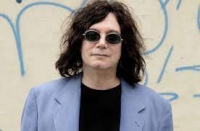
Alan Merrill (born Allan Preston Sachs; February 19, 1951 – March 29, 2020) was an American vocalist, guitarist, songwriter, actor and model. In the early 1970s, he was one of the first resident foreigners to achieve pop star status in Japan. He was the writer of, and lead singer on, the first released version of the song "I Love Rock 'n' Roll", which was recorded by the Arrows in 1975. The song became a breakthrough hit for Joan Jett in 1982.Merrill was primarily a vocalist and songwriter, but also played the guitar, bass guitar, harmonica, and keyboards.
Demi Lovato

Demetria "Demi" Devonne Lovato (born August 20, 1992) is an American actress, singer and songwriter. She is best known for her role as Mitchie Torres in the Disney Channel Original Movie Camp Rock and for her role as Charlotte Adams in the short five-minute Disney Channel series As The Bell Rings. She is currently on the Burning Up Tour with the Jonas Brothers.
Tori Amos
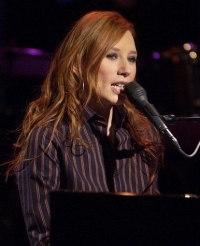
Tori Amos (born Myra Ellen Amos on August 22, 1963) is a pianist and singer-songwriter of dual British and American citizenship. She is married to English sound engineer Mark Hawley, with whom she has one child, Natashya "Tash" Lórien Hawley, born on September 5, 2000.
Amos was at the forefront of a number of female singer-songwriters in the early 1990s and was noteworthy early in her career as one of the few alternative rock performers to use a piano as her primary instrument. She is known for emotionally intense songs that cover a wide range of subjects including sexuality, religion and personal tragedy. Some of her charting singles include "Crucify", "Silent All These Years", "Cornflake Girl", "Caught a Lite Sneeze", "Professional Widow", "Spark", and "A Sorta Fairytale".
Amos had sold 12 million records worldwide as of 2005 and has also enjoyed a large cult following. Having a history of making eccentric and at times ribald comments during concerts and interviews, she has earned a reputation for being highly idiosyncratic. As a social commentator and sometimes activist, some of the topics she has been most vocal about include feminism, religion, and sexuality.
Amos was at the forefront of a number of female singer-songwriters in the early 1990s and was noteworthy early in her career as one of the few alternative rock performers to use a piano as her primary instrument. She is known for emotionally intense songs that cover a wide range of subjects including sexuality, religion and personal tragedy. Some of her charting singles include "Crucify", "Silent All These Years", "Cornflake Girl", "Caught a Lite Sneeze", "Professional Widow", "Spark", and "A Sorta Fairytale".
Amos had sold 12 million records worldwide as of 2005 and has also enjoyed a large cult following. Having a history of making eccentric and at times ribald comments during concerts and interviews, she has earned a reputation for being highly idiosyncratic. As a social commentator and sometimes activist, some of the topics she has been most vocal about include feminism, religion, and sexuality.
Celine Dion

Céline Marie Claudette Dion (born March 30, 1968 in Charlemagne, Quebec) is a Canadian singer, and occasional songwriter and actress.
Dion had first gained international recognition in the 1980s by winning both the 1982 Yamaha World Popular Song Festival and the 1988 Eurovision Song Contest.
Dion's music has been influenced by genres ranging from rock and R&B to gospel and classical, and while her releases have often received mixed critical reception, she is renowned for her technically skilled and powerful vocals.
Dion had first gained international recognition in the 1980s by winning both the 1982 Yamaha World Popular Song Festival and the 1988 Eurovision Song Contest.
Dion's music has been influenced by genres ranging from rock and R&B to gospel and classical, and while her releases have often received mixed critical reception, she is renowned for her technically skilled and powerful vocals.
Kiss Me, Kate
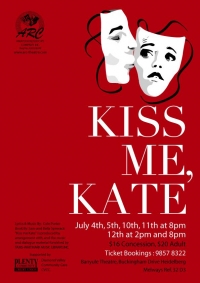
Kiss Me, Kate is a musical with music and lyrics by Cole Porter. It is structured as a play within a play, where the interior play is a musical version of The Taming of the Shrew.
Kiss Me, Kate was a comeback and a personal triumph for Cole Porter. After several successful musicals in the 1930s, notably Anything Goes, Du Barry Was a Lady, and Panama Hattie, he experienced an equestrian accident in 1937 that left him in constant pain. Following the accident, he continued to write songs and musicals but with limited success, and some thought he was past his prime. Kiss Me, Kate was a response to Rodgers and Hammerstein's Oklahoma! and other integrated musicals, and it proved to be his biggest hit and the only one of his shows to run for more than 1,000 performances on Broadway. It won the first Tony Award presented for Best Musical, in 1949.
Kiss Me, Kate was a comeback and a personal triumph for Cole Porter. After several successful musicals in the 1930s, notably Anything Goes, Du Barry Was a Lady, and Panama Hattie, he experienced an equestrian accident in 1937 that left him in constant pain. Following the accident, he continued to write songs and musicals but with limited success, and some thought he was past his prime. Kiss Me, Kate was a response to Rodgers and Hammerstein's Oklahoma! and other integrated musicals, and it proved to be his biggest hit and the only one of his shows to run for more than 1,000 performances on Broadway. It won the first Tony Award presented for Best Musical, in 1949.
Stephen Schwartz
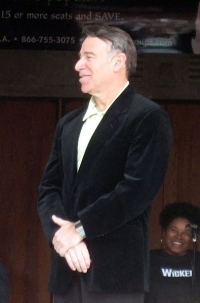
Stephen Lawrence Schwartz (born March 6, 1948) is an American musical theater lyricist and composer. In a career already spanning over four decades, Schwartz has written such hit musicals as Godspell (1971), Pippin (1972) and Wicked (2003). He has also contributed lyrics for a number of successful films, including Pocahontas (1995), The Hunchback of Notre Dame (1996), The Prince of Egypt (1998; music and lyrics) and Enchanted (2007). Schwartz has won the Drama Desk Award for Outstanding Lyrics, three Grammy Awards, and three Academy Awards and has been nominated for six Tony Awards.
Barry Manilow
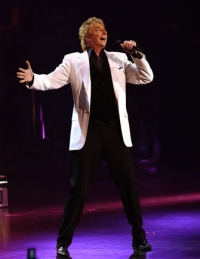
Barry Manilow (born June 17, 1943) is an American singer-songwriter, musician, arranger, producer and conductor, best known for such recordings as I Write the Songs, Mandy, Weekend in New England and Copacabana.
Manilow's achievements include sales of more than 76 million records worldwide. In 1978, five of his albums were on the best-selling charts simultaneously; a feat equalled only by Frank Sinatra and Johnny Mathis. He has recorded a string of Billboard hit singles and multi-platinum albums that have resulted in his being named Radio & Records number one Adult Contemporary artist and winning three straight American Music Awards for Favorite Pop/Rock Male Artist. Several well-known entertainers have given Manilow their "stamp of approval," including Sinatra, who was quoted in the 1970s regarding Manilow, "He's next." In 1988, Bob Dylan stopped Manilow at a party, hugged him and said, "Don't stop what you're doing, man. We're all inspired by you." Arsenio Hall cited Manilow as a favorite guest on The Arsenio Hall Show and admonished his audience to respect him for his work.
As well as producing and arranging albums for other artists, such as Bette Midler, Dionne Warwick and Rosemary Clooney, Manilow has written songs for musicals, films, and commercials.
Since February 2005, he has been the headliner at the Las Vegas Hilton, and has performed hundreds of shows since.
Manilow's achievements include sales of more than 76 million records worldwide. In 1978, five of his albums were on the best-selling charts simultaneously; a feat equalled only by Frank Sinatra and Johnny Mathis. He has recorded a string of Billboard hit singles and multi-platinum albums that have resulted in his being named Radio & Records number one Adult Contemporary artist and winning three straight American Music Awards for Favorite Pop/Rock Male Artist. Several well-known entertainers have given Manilow their "stamp of approval," including Sinatra, who was quoted in the 1970s regarding Manilow, "He's next." In 1988, Bob Dylan stopped Manilow at a party, hugged him and said, "Don't stop what you're doing, man. We're all inspired by you." Arsenio Hall cited Manilow as a favorite guest on The Arsenio Hall Show and admonished his audience to respect him for his work.
As well as producing and arranging albums for other artists, such as Bette Midler, Dionne Warwick and Rosemary Clooney, Manilow has written songs for musicals, films, and commercials.
Since February 2005, he has been the headliner at the Las Vegas Hilton, and has performed hundreds of shows since.
Stephen Pearson
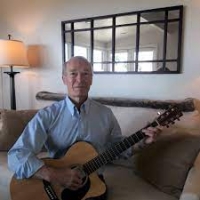
Although my training and career was as a lawyer, my personal worlds were in the mountains and in song. From 1995-2005, I wrote music and lyrics for the 150 Psalms (as well as related devotional music), and established a web site, www.psalmistry.com, to share the work with fellow praise and worship teams. I am now retired from my profession, but not the mountains or music. The changes in music technology continue to add exciting avenues of expression and creation.
Chris Tomlin
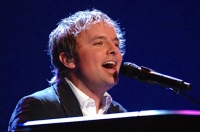
Christopher Dwayne Tomlin (born May 4, 1972) is a Christian worship leader and songwriter from Grand Saline, Texas, United States. He is a staff member at Austin Stone Community Church and is signed to EMI's sixstepsrecords. Tomlin also leads worship at many Passion events. Some of his most well-known songs are "How Great Is Our God", "Indescribable", "Forever", "Famous One", "We Fall Down", "Holy Is the Lord" and "Made to Worship".
According to the Christian Copyright Licensing International, Tomlin is the most sung Christian artist in the United States. He was awarded Male Vocalist at the 2006 and 2007 Gospel Music Awards, and was named Artist of the Year in 2007 and 2008. Chris Tomlin will be releasing his 7th studio album "Hello Love" which is due September 2nd 2008.
According to the Christian Copyright Licensing International, Tomlin is the most sung Christian artist in the United States. He was awarded Male Vocalist at the 2006 and 2007 Gospel Music Awards, and was named Artist of the Year in 2007 and 2008. Chris Tomlin will be releasing his 7th studio album "Hello Love" which is due September 2nd 2008.
Kenneth Gamble
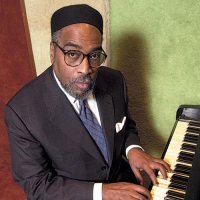
Kenneth Gamble (born August 11, 1943, Philadelphia, Pennsylvania) and Leon A. Huff (born April 8, 1942, Camden, New Jersey) are an American songwriting and production team credited for developing the Philadelphia soul music genre (also known as Philly sound) of the 1970s. In addition to forming their own label, Philadelphia International Records, Gamble and Huff have written and produced 175 gold and platinum records, earning them an induction into the Rock and Roll Hall of Fame in the non-performer category in March 2008.
ETC
Etc... is a Czech rock band from Prague, formed in 1974 by singer and guitarist Vladimír Mišík. Various musicians have rotated through the group's ranks, including violist Jan Hrubý, bassist Jiří ..
Oliver!
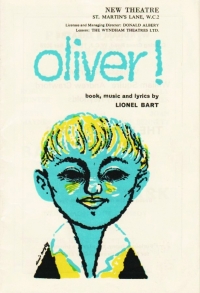
Oliver! is a British musical, with music and lyrics by Lionel Bart. It first appeared in the West End in 1960, enjoying a long run, and was made into a film directed by Carol Reed in 1968.
The musical is loosely based upon the novel Oliver Twist by Charles Dickens. That it was the first musical adaptation of a Charles Dickens work to become a stage hit was one of the reasons why it attracted such attention. There had been two previous Dickens musicals in the 1950s, both of them television adaptations of A Christmas Carol, but the dramatic story of Oliver Twist was the first Dickens work to be presented as a successful stage musical. Another reason for the success of the musical was the revolving stage set, an innovation designed by Sean Kenny.
The show launched the careers of several child actors, including Davy Jones, later of The Monkees; Phil Collins, later of Genesis; and Tony Robinson, who later played the role of Baldrick in the television series Black Adder. The singer Steve Marriott (Small Faces, Humble Pie) also featured in early line-ups, eventually graduating to the role of Artful Dodger in the West End production.
The plot of Dickens's original novel is considerably simplified for the purposes of the musical, with Fagin being represented more as a comic character than as a villain, and large portions of the latter part of the story being completely left out. Although Dickens' novel has been called antisemitic in its portrayal of the Jew Fagin as evil, the production by Bart (himself a Jew) featured many Jewish actors in leading roles: Ron Moody (Ronald Moodnik), Georgia Brown (Lilian Klot), and Martin Horsey.
The musical is loosely based upon the novel Oliver Twist by Charles Dickens. That it was the first musical adaptation of a Charles Dickens work to become a stage hit was one of the reasons why it attracted such attention. There had been two previous Dickens musicals in the 1950s, both of them television adaptations of A Christmas Carol, but the dramatic story of Oliver Twist was the first Dickens work to be presented as a successful stage musical. Another reason for the success of the musical was the revolving stage set, an innovation designed by Sean Kenny.
The show launched the careers of several child actors, including Davy Jones, later of The Monkees; Phil Collins, later of Genesis; and Tony Robinson, who later played the role of Baldrick in the television series Black Adder. The singer Steve Marriott (Small Faces, Humble Pie) also featured in early line-ups, eventually graduating to the role of Artful Dodger in the West End production.
The plot of Dickens's original novel is considerably simplified for the purposes of the musical, with Fagin being represented more as a comic character than as a villain, and large portions of the latter part of the story being completely left out. Although Dickens' novel has been called antisemitic in its portrayal of the Jew Fagin as evil, the production by Bart (himself a Jew) featured many Jewish actors in leading roles: Ron Moody (Ronald Moodnik), Georgia Brown (Lilian Klot), and Martin Horsey.
The Pussycat Dolls

Pussycat Dolls (abbreviated to PCD) are an American girl group and dance ensemble founded by choreographer Robin Antin in 1995 as a burlesque troupe based in Los Angeles. After attracting national attention, Antin eventually negotiated a record deal with Interscope Records in 2003 turning the group into a music franchise, comprising Nicole Scherzinger alongside Carmit Bachar, Melody Thornton, Jessica Sutta, Ashley Roberts and Kimberly Wyatt. Since then the group has developed a global image and commercial brand overseen by Antin, Interscope and various partners. They have diversified into reality television programs, a Las Vegas act and product endorsements amongst other things.
Success as a music group came in 2005 with their first album PCD which debuted at number five in the US producing three successful singles "Don't Cha", "Buttons", and "Stickwitu"; the latter earned the group a Grammy Award nomination. Following the departure of Carmit Bachar in February 2008, the group continued as a quintet and in September of that year they released their second album, Doll Domination, spawning singles "When I Grow Up", "I Hate This Part" and "Jai Ho! (You Are My Destiny)".
Success as a music group came in 2005 with their first album PCD which debuted at number five in the US producing three successful singles "Don't Cha", "Buttons", and "Stickwitu"; the latter earned the group a Grammy Award nomination. Following the departure of Carmit Bachar in February 2008, the group continued as a quintet and in September of that year they released their second album, Doll Domination, spawning singles "When I Grow Up", "I Hate This Part" and "Jai Ho! (You Are My Destiny)".
Augustana
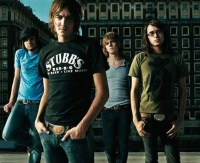
Augustana is an American rock band from San Diego, California who are signed to the Epic Records record label and are best known for their single, "Boston."
Augustana's debut album, Midwest Skies and Sleepless Mondays was released in 2003 and only 1000 copies were produced, later that year the band recorded Mayfield EP and only 25 copies were made. After band members Dan Layus and Josiah Rosen had formed Augustana in Greenville, Illinois, they moved to southern California where they found their drummer, Justin South. Augustana were then soon discovered by Grammy-Award winning record producer Stephen Short, along with Michael Rosenblatt, who became their managers and helped them sign a record deal with Epic Records as well as a publishing deal with EMI. Short and Rosenblatt continue to manage the band. The band found fame with their second album, All the Stars and Boulevards, which sold 300,000 copies in the United States, including over 1,000,000 singles of "Boston".
Augustana's debut album, Midwest Skies and Sleepless Mondays was released in 2003 and only 1000 copies were produced, later that year the band recorded Mayfield EP and only 25 copies were made. After band members Dan Layus and Josiah Rosen had formed Augustana in Greenville, Illinois, they moved to southern California where they found their drummer, Justin South. Augustana were then soon discovered by Grammy-Award winning record producer Stephen Short, along with Michael Rosenblatt, who became their managers and helped them sign a record deal with Epic Records as well as a publishing deal with EMI. Short and Rosenblatt continue to manage the band. The band found fame with their second album, All the Stars and Boulevards, which sold 300,000 copies in the United States, including over 1,000,000 singles of "Boston".
Neil Diamond
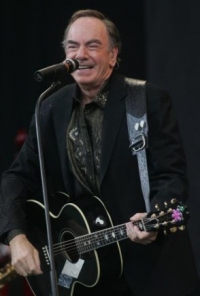
Neil Leslie Diamond (born January 24, 1941) is an American singer-songwriter and occasional actor.
Neil Diamond is one of pop music's most enduring and successful singer-songwriters. As a successful pop music performer, Diamond scored a number of hits worldwide in the 1960s, 1970s, and 1980s. Critic William Ruhlmann wrote of Diamond, "As of 2001, he claimed worldwide record sales of 115 million copies, and as of 2002 he was ranked third, behind only Elton John and Barbra Streisand, on the list of the most successful adult contemporary artists in the history of the Billboard chart." As of May 2005 Diamond had sold 120 million records worldwide, including 48 million records in the U.S.
Though his record sales declined somewhat after the 1980s, Diamond continues to tour successfully, and maintains a very loyal following. Diamond's songs have been recorded by a vast array of performers from many different musical genres.
Diamond was inducted into the Songwriters Hall of Fame in 1984, and in 2000 received the Sammy Cahn Lifetime Achievement Award.
Neil Diamond is one of pop music's most enduring and successful singer-songwriters. As a successful pop music performer, Diamond scored a number of hits worldwide in the 1960s, 1970s, and 1980s. Critic William Ruhlmann wrote of Diamond, "As of 2001, he claimed worldwide record sales of 115 million copies, and as of 2002 he was ranked third, behind only Elton John and Barbra Streisand, on the list of the most successful adult contemporary artists in the history of the Billboard chart." As of May 2005 Diamond had sold 120 million records worldwide, including 48 million records in the U.S.
Though his record sales declined somewhat after the 1980s, Diamond continues to tour successfully, and maintains a very loyal following. Diamond's songs have been recorded by a vast array of performers from many different musical genres.
Diamond was inducted into the Songwriters Hall of Fame in 1984, and in 2000 received the Sammy Cahn Lifetime Achievement Award.
Alfonso Esparza Oteo
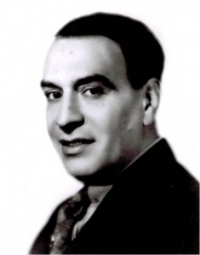
Alfonso Esparza Oteo was a Mexican composer. Esparza first success among Mexico City music fans was a foxtrot, and his music was enormously popular in the 1920s. Álvaro Obregón was listening to "El Limoncito", one of Esparza's compositions, when he was assassinated.
RICO BLANCO
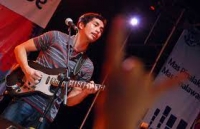
Rico Rene Granados Blanco (born March 17, 1973) is a Filipino singer, songwriter, multi-instrumentalist, record producer, actor, endorser and entrepreneur. He began his career as one of the founding members, and served as the chief songwriter, vocalist, guitarist, and keyboardist of the Filipino rock band Rivermaya from 1994 until 2007, and has been a solo artist since 2008.Blanco's songs and performances gained success and critical acclaim, earning himself a reputation of being one of the well received local music icons in the Philippines.
Peter Vantine
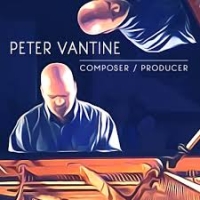
assachusetts native Peter Vantine has been composing, arranging and producing music professionally for nearly 30 years. His music has been featured in concert as well as various media outlets, including The Biography Channel, The Discovery Channel, MTV, PBS, Warner Brothers Online, Salem Wax Museum, and The Learning Company. He was the grand prize recipient of the 2001 Turner Classic Movies Young Composer’s Competition and has produced over 30 music CDs (many of which include his own music) while arranging or performing on many others.
Meat Loaf
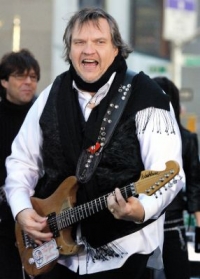
Michael Lee Aday (born Marvin Lee Aday; September 27, 1947), better known by his stage name Meat Loaf, is an American rock musician and actor of stage and screen. He is noted for the Bat out of Hell album trilogy that he created consisting of Bat out of Hell, Bat out of Hell II: Back into Hell, and Bat out of Hell III: The Monster Is Loose and several famous songs from popular films. The Neverland Express is the name of the band he fronts as its lead singer. In 2001, he changed his first name to Michael. Despite setbacks (including multiple bankruptcies), Meat Loaf has had a successful music career, spawning some of the largest-selling albums, and breaking several records for chart duration. Bat out of Hell, the debut album which had been four years in the making, has sold over 37 million copies. After almost 30 years, it still sells an estimated 200,000 copies annually, and stayed on the charts for over 9 years. Each of the seven tracks on the album eventually charted as a hit single.
Although he enjoyed success with Bat out of Hell and Bat out of Hell II: Back into Hell, Meat Loaf experienced some initial difficulty establishing a steady career within his native United States; however, he has retained iconic status and popularity in Europe, especially the UK, where he ranks 23rd for number of weeks overall spent on the charts, and is one of only two artists with an album never to have left the music charts. With the help of his New York collection of musicians — John Golden, Richard Raskin and Paul Jacobs — his European tours enjoyed immense popularity in the 1980s. In Germany, Meat Loaf became notably popular following the release of Bat out of Hell II but has enjoyed most of his success among pop/rock fans. He ranked 96th on VH1's '100 Greatest Artists of Hard Rock'.
Although he enjoyed success with Bat out of Hell and Bat out of Hell II: Back into Hell, Meat Loaf experienced some initial difficulty establishing a steady career within his native United States; however, he has retained iconic status and popularity in Europe, especially the UK, where he ranks 23rd for number of weeks overall spent on the charts, and is one of only two artists with an album never to have left the music charts. With the help of his New York collection of musicians — John Golden, Richard Raskin and Paul Jacobs — his European tours enjoyed immense popularity in the 1980s. In Germany, Meat Loaf became notably popular following the release of Bat out of Hell II but has enjoyed most of his success among pop/rock fans. He ranked 96th on VH1's '100 Greatest Artists of Hard Rock'.
George Gershwin

George Gershwin (September 26, 1898 – July 11, 1937) was an American composer. He wrote most of his vocal and theatrical works in collaboration with his elder brother, lyricist Ira Gershwin. George Gershwin composed songs both for Broadway and for the classical concert hall. He also wrote popular songs with success.
Many of his compositions have been used on television and in numerous films, and many became jazz standards. The jazz singer Ella Fitzgerald recorded many of the Gershwins' songs on her 1959 Gershwin Songbook (arranged by Nelson Riddle). Countless singers and musicians have recorded Gershwin songs, including Fred Astaire, Louis Armstrong, Al Jolson, Bobby Darin, Art Tatum, Bing Crosby, Janis Joplin, John Coltrane, Frank Sinatra, Billie Holiday, Sam Cooke, Miles Davis, Herbie Hancock, Madonna, Judy Garland, Julie Andrews, Barbra Streisand, Marni Nixon, Natalie Cole, Patti Austin, Nina Simone, Maureen McGovern, John Fahey, The Residents, Than & Sam, Sublime, and Sting. A residential building is named after him on the Stony Brook University campus.
Many of his compositions have been used on television and in numerous films, and many became jazz standards. The jazz singer Ella Fitzgerald recorded many of the Gershwins' songs on her 1959 Gershwin Songbook (arranged by Nelson Riddle). Countless singers and musicians have recorded Gershwin songs, including Fred Astaire, Louis Armstrong, Al Jolson, Bobby Darin, Art Tatum, Bing Crosby, Janis Joplin, John Coltrane, Frank Sinatra, Billie Holiday, Sam Cooke, Miles Davis, Herbie Hancock, Madonna, Judy Garland, Julie Andrews, Barbra Streisand, Marni Nixon, Natalie Cole, Patti Austin, Nina Simone, Maureen McGovern, John Fahey, The Residents, Than & Sam, Sublime, and Sting. A residential building is named after him on the Stony Brook University campus.
Dream Theater
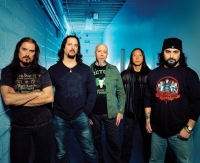
Dream Theater is an American progressive metal band formed in 1985 under the name Majesty by John Petrucci, John Myung, and Mike Portnoy while they attended Berklee College of Music in Massachusetts, before they dropped out to support the band. Though a number of lineup changes followed, the three original members remain today along with James LaBrie and Jordan Rudess.
Dream Theater has become a successful progressive metal band. Although the band has had one successful hit ("Pull Me Under" in 1992, which received extensive MTV rotation), they have remained relatively out of the mainstream.
The band is well known for the technical proficiency of its instrumentalists, who have won many awards from music instruction magazines. Dream Theater's members have collaborated with many other notable musicians. Guitarist John Petrucci has been named as the third player on the G3 tour six times, more than any other invited guitarist, following in the footsteps of Eric Johnson and Robert Fripp. Drummer Mike Portnoy has won 23 awards from Modern Drummer Magazine and is also the second youngest person (at the age of 37) to be inducted into the Rock Drummer Hall of Fame.
The band's highest selling album is the gold selling Images and Words (1992), which reached #61 on the Billboard 200 charts. Both the 1994 release Awake and their 2002 release Six Degrees of Inner Turbulence also entered the charts at #32 and #46 respectively and received mostly positive reviews. Six Degrees of Inner Turbulence also led to Dream Theater becoming the initial band reviewed in the Music Section of Entertainment Weekly during its opening week of release, despite the magazine generally preferring more mainstream music. In 2007, Systematic Chaos entered US Billboard 200 at #19. Dream Theater has sold over two million albums in the U.S., and over 8 million records worldwide. The band's tenth studio album, Black Clouds & Silver Linings, was released on June 23, 2009. It entered the US Billboard 200 at #6 and Eurochart Hot 100 at #1, marking their highest entry on either chart. Currently the musician and writer Jose Aranda is writing a doctoral thesis book about Dream Theater and the meaning of music.
Dream Theater has become a successful progressive metal band. Although the band has had one successful hit ("Pull Me Under" in 1992, which received extensive MTV rotation), they have remained relatively out of the mainstream.
The band is well known for the technical proficiency of its instrumentalists, who have won many awards from music instruction magazines. Dream Theater's members have collaborated with many other notable musicians. Guitarist John Petrucci has been named as the third player on the G3 tour six times, more than any other invited guitarist, following in the footsteps of Eric Johnson and Robert Fripp. Drummer Mike Portnoy has won 23 awards from Modern Drummer Magazine and is also the second youngest person (at the age of 37) to be inducted into the Rock Drummer Hall of Fame.
The band's highest selling album is the gold selling Images and Words (1992), which reached #61 on the Billboard 200 charts. Both the 1994 release Awake and their 2002 release Six Degrees of Inner Turbulence also entered the charts at #32 and #46 respectively and received mostly positive reviews. Six Degrees of Inner Turbulence also led to Dream Theater becoming the initial band reviewed in the Music Section of Entertainment Weekly during its opening week of release, despite the magazine generally preferring more mainstream music. In 2007, Systematic Chaos entered US Billboard 200 at #19. Dream Theater has sold over two million albums in the U.S., and over 8 million records worldwide. The band's tenth studio album, Black Clouds & Silver Linings, was released on June 23, 2009. It entered the US Billboard 200 at #6 and Eurochart Hot 100 at #1, marking their highest entry on either chart. Currently the musician and writer Jose Aranda is writing a doctoral thesis book about Dream Theater and the meaning of music.
Pantera
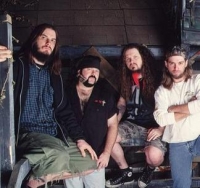
Pantera (/pænˈtɛrə/) was an American heavy metal band from Arlington, Texas, formed in 1981. The group's best-known lineup consisted of the Abbott brothers—drummer Vinnie Paul and guitarist Dimebag Darrell—along with vocalist Phil Anselmo and bassist Rex Brown. In addition to their development and popularization of the groove metal subgenre, Pantera is credited (along with others, such as Testament, Sepultura and Machine Head) for being part of the second wave of thrash metal scene from the late 1980s to early-to-mid 1990s. Pantera is regarded as one of the most successful and influential bands in heavy metal history, having sold around 40 million records worldwide, and being nominated four times at the Grammy's.
MC The Max

M.C The MAX is a South Korean rock band. They debuted in 2000 as a 4-member band under the name Moon Child. After the departure of member Heo Jung-min, members Lee Soo, Jeon Min-hyuk and J. Yoon regrouped in 2002 as M.C the MAX.
SNSD

Girls' Generation (Korean: 少女時代;소녀시대) is a South Korean nine-member girl group formed by SM Entertainment in 2007. Its members include Yoona, Tiffany, Yuri, Hyoyeon, Sooyoung, Seohyun, Taeyeon, Jessica, and Sunny. They are commonly referred to as SNSD, the acronym of the group's Korean name So Nyeo Shi Dae or So Nyuh Shi Dae.
The group has released two albums and various singles. Their biggest song is "Gee", which is the longest-running #1 song on KBS's Music Bank, at 9 weeks total.
The members of the group have had various activities as solo entertainers — acting in various dramas and musicals, hosting various reality-variety shows, and releasing solo singles.
The group has released two albums and various singles. Their biggest song is "Gee", which is the longest-running #1 song on KBS's Music Bank, at 9 weeks total.
The members of the group have had various activities as solo entertainers — acting in various dramas and musicals, hosting various reality-variety shows, and releasing solo singles.
Traditional

Josef Rheinberger
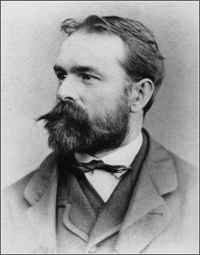
Josef Gabriel Rheinberger was an organist and composer, born in Liechtenstein and resident for most of his life in Germany.
Peter Cornelius
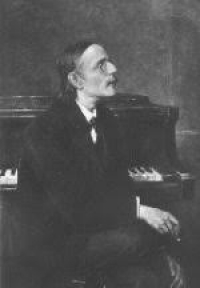
Carl August Peter Cornelius was a German composer, writer about music, poet and translator. Born: December 24, 1824, Mainz, Germany Died: October 26, 1874, Mainz, Germany Children: Carl Maria Cornelius Record labels: Hyperion Records Limited, Preiser Records, BBC Legends Siblings: Carl Adolph Cornelius
Elvis Costello
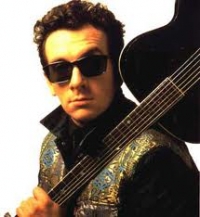
Elvis Costello (born Declan Patrick MacManus, 25 August 1954) is an English singer-songwriter. He came to prominence as an early participant in London's pub rock scene in the mid-1970s and later became associated with the punk/New Wave genre. Steeped in word play, the vocabulary of Costello's lyrics is broader than that of most popular songs. His music has drawn on many diverse genres; one critic described him as a "pop encyclopedia", able to "reinvent the past in his own image".
Costello has won multiple awards in his career, including a Grammy Award, and has twice been nominated for the Brit Award for Best British Male. In 2003, Elvis Costello & the Attractions was inducted into the Rock and Roll Hall of Fame. In 2004, Rolling Stone ranked Costello number 80 on their list of the 100 Greatest Artists of All Time.
Costello has won multiple awards in his career, including a Grammy Award, and has twice been nominated for the Brit Award for Best British Male. In 2003, Elvis Costello & the Attractions was inducted into the Rock and Roll Hall of Fame. In 2004, Rolling Stone ranked Costello number 80 on their list of the 100 Greatest Artists of All Time.
Beatriz Corona
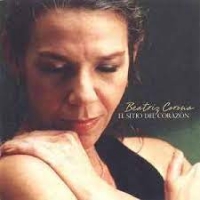
Beatriz del Carmen Corona Rodríguez is a composer, choir director, arranger and musical producer. She is one of the most solid and prestigious composers of Choral Music in Cuba as well as one of Cuba's most prolific contemporary composers.
Lavrentis maxairitsas
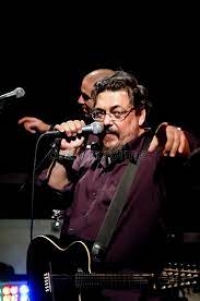
Lavrentis Machairitsas Greek musician Lavrentis Machairitsas was a Greek rock musician from Volos, Thessaly, Greece. Wikipedia Born: November 5, 1956, Volos, Greece Died: September 9, 2019, Volos, Greece SongsMikros Titanikos
Rixe Kokkino Sti Nihta · 1993 Etsi Ki Allios 2016 Matia Dihos Logiki To Dialimma Kratai Dio Zoes · 2001
Rixe Kokkino Sti Nihta · 1993 Etsi Ki Allios 2016 Matia Dihos Logiki To Dialimma Kratai Dio Zoes · 2001
Théodore-César Salom
Théodore-César Salomé (20 January 1834 – 26 July 1896) was a French organist and composer.Théodore Salomé was born in Paris. He completed all of his musical studies at the Conservatoire de Paris, under the tutelage of François Bazin for harmony and accompaniment, and François Benoist for organ. He won several honorable awards, including: second prize in harmony (1855), second prize in organ and in harmony (1856), second and third prize in harmony and organ (1857), and second prize in harmony (1859). His cantata Atala was awarded the premier Second Grand Prix of the Prix de Rome in 1861. In the same year Théodore Dubois was awarded the first grand prize, and Eugène Anthiome and Titus Constantin won the deuxième Second Grand Prix.
Sting
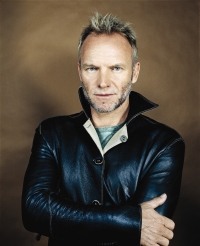
Gordon Matthew Thomas Sumner, CBE (born October 2, 1951), better known by his stage name Sting, is a three time Academy Award-nominated and multiple Grammy-winning English musician from Wallsend in North Tyneside. Prior to starting his solo career, he was the principal songwriter, lead singer and bassist of the rock band The Police. As a solo musician and member of The Police, Sting has sold over 100 million records, and received over sixteen Grammy Awards for his work, receiving his first Grammy for Best Rock Instrumental Performance in 1981, and receiving an Oscar nomination for best song.
Sting has stated that he gained his nickname while with the Phoenix Jazzmen. He once performed wearing a black and yellow sweater with hooped stripes that bandleader Gordon Solomon had noted made him look like a bumblebee; thus Sumner became "Sting". He uses Sting almost exclusively, except on official documents. In a press conference filmed in the movie Bring on the Night, he jokingly stated when referred to by a journalist as Gordon, "My children call me Sting, my mother calls me Sting, who is this Gordon character?"
Sting has stated that he gained his nickname while with the Phoenix Jazzmen. He once performed wearing a black and yellow sweater with hooped stripes that bandleader Gordon Solomon had noted made him look like a bumblebee; thus Sumner became "Sting". He uses Sting almost exclusively, except on official documents. In a press conference filmed in the movie Bring on the Night, he jokingly stated when referred to by a journalist as Gordon, "My children call me Sting, my mother calls me Sting, who is this Gordon character?"
Mary J. Blige

Mary Jane Blige, also known as Mary J. Blige, is a famous American hip hop and R&B singer. She is known today as the "queen of hip hop" along with Missy Elliott. In addition to 8 Grammy awards, the artist was the only person to be shown to hip hop and soul awards in the 90s at the same time.
Snow Patrol
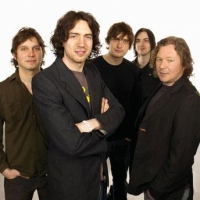
Snow Patrol are a Northern Irish alternative rock band which formed in Dundee, Scotland, with the majority of their members being from Bangor and Belfast, Northern Ireland. They are based in Glasgow and are signed to Polydor Records. Originally formed as an indie rock band, Snow Patrol have sought a more alternative rock and powerpop sound in recent years on the heels of mainstream success with the songs "Run", "Chasing Cars" and "Signal Fire" from the Spider-Man 3 soundtrack.
The band's first three records, including their first EP—Starfighter Pilot, Songs for Polarbears and When It's All Over We Still Have to Clear Up—were commercially unsuccessful and were released with an independent record label. When the band moved to a major record label Polydor Records they released their 2003 album Final Straw which crossed 4x platinum sales in the UK. The band achieved worldwide success due to 2006's Eyes Open, which sold 4.7 million copies worldwide. Snow Patrol has been nominated for 3 BRIT Awards and has won five Meteors. Worldwide, the band has sold over 7 million albums.
Current members:
Gary Lightbody– Vocals, guitar
Jonny Quinn – Drums, percussion
Nathan Connolly – Guitar, vocals
Paul Wilson – Bass guitar, vocals
Tom Simpson – Keyboards
The band's first three records, including their first EP—Starfighter Pilot, Songs for Polarbears and When It's All Over We Still Have to Clear Up—were commercially unsuccessful and were released with an independent record label. When the band moved to a major record label Polydor Records they released their 2003 album Final Straw which crossed 4x platinum sales in the UK. The band achieved worldwide success due to 2006's Eyes Open, which sold 4.7 million copies worldwide. Snow Patrol has been nominated for 3 BRIT Awards and has won five Meteors. Worldwide, the band has sold over 7 million albums.
Current members:
Gary Lightbody– Vocals, guitar
Jonny Quinn – Drums, percussion
Nathan Connolly – Guitar, vocals
Paul Wilson – Bass guitar, vocals
Tom Simpson – Keyboards
Ryan Cayabyab
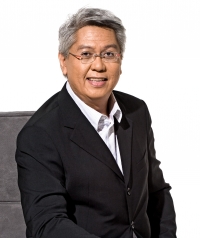
Ryan Cayabyab (born Raymundo Cipriano Pujante Cayabyab on May 4, 1954 in Manila, Philippines but known as Mr. C) is a Filipino musician and was the Executive and Artistic Director of the defunct San Miguel Foundation for the Performing Arts. He was also a resident judge for the only season of Philippine Idol in 2006.
His works range from commissioned full-length ballets, theater musicals, choral pieces, a Mass set to unaccompanied chorus, and orchestral pieces, to commercial recordings of popular music, film scores and television specials.
His works range from commissioned full-length ballets, theater musicals, choral pieces, a Mass set to unaccompanied chorus, and orchestral pieces, to commercial recordings of popular music, film scores and television specials.
Tielman Susato
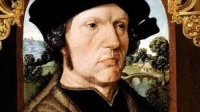
Tielman (or Tylman) Susato (c. 1510/15 – after 1570) was a Renaissance composer, instrumentalist and publisher of music in Antwerp.While Susato's exact place of birth is unknown, some scholars believe that because of his name—Susato meaning de Soest, of the town of Soest — he may be from the town of that name in Westphalia, or the town of Soest in The Netherlands.
Karine Polwart
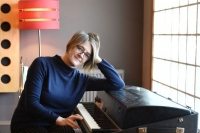
Karine Polwart is a Scottish singer-songwriter. She writes and performs music with a strong folk and roots feel, her songs dealing with a variety of issues from alcoholism to genocide.
Enrique Iglesias
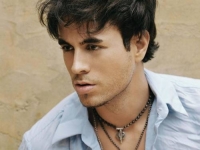
Enrique Miguel Iglesias Preysler (born May 8, 1975) is a Spanish-Filipino pop singer-songwriter. His career started in Mexico on Indie label Fonovisa who helped turn him into one of the most popular artists in Latin America and in the Latin market in the United States, selling more Spanish albums than any other artists in that period of time. Before the turn of the millennium he made a crossover into the mainstream English market and signed a unique multi-album deal with Universal Music for an unprecedented $48,000,000, with Universal Music Latino to release his Spanish albums and Interscope to release English albums, Enrique Iglesias has so far sold over 50.000.000 albums worldwide. Iglesias has had two Billboard Hot 100 #1s and one #3, and he holds the record for producing eighteen number #1 Spanish-language singles on the Billboard's Hot Latin Tracks.
Diana Ross
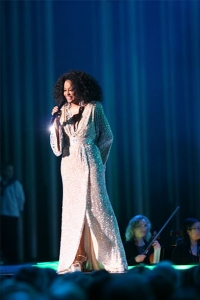
Diana Ross (born Diana Ernestine Earle Ross, March 26, 1944) is an American singer and actress. During the 1960s, she helped shape the Motown sound as lead singer of The Supremes, before leaving the group for a solo career on January 14, 1970. Since the beginning of her career with The Supremes and as a solo artist, Ross has sold more than 100 million records.
During the 1970s and through the mid-1980s, Ross was among the most successful female artists, crossing over into film, television and Broadway. She received a Best Actress Academy Award nomination for her 1972 role as Billie Holiday in Lady Sings the Blues, for which she won a Golden Globe award for. She won awards at the American Music Awards, garnered twelve Grammy Award nominations, and won a Tony Award for her one-woman show, An Evening with Diana Ross, in 1977.
In 1976, Billboard magazine named her the "Female Entertainer of the Century." In 1993, the Guinness Book of World Records declared Diana Ross the most successful female music artist in history with a total of eighteen American number-one singles: twelve as lead singer of The Supremes and six as a soloist. Ross was the first female solo artist to score six number-ones. This feat puts her in a tie for fifth place among solo female artists with the most number-ones on the Hot 100. She is also one of the few recording artists to have two stars on the Hollywood Walk of Fame—one as a solo artist and the other as a member of The Supremes. In December 2007, she received a John F. Kennedy Center for the Performing Arts Honors Award.
Including her work with The Supremes, Ross has released 67 albums. Ross is a soprano.
During the 1970s and through the mid-1980s, Ross was among the most successful female artists, crossing over into film, television and Broadway. She received a Best Actress Academy Award nomination for her 1972 role as Billie Holiday in Lady Sings the Blues, for which she won a Golden Globe award for. She won awards at the American Music Awards, garnered twelve Grammy Award nominations, and won a Tony Award for her one-woman show, An Evening with Diana Ross, in 1977.
In 1976, Billboard magazine named her the "Female Entertainer of the Century." In 1993, the Guinness Book of World Records declared Diana Ross the most successful female music artist in history with a total of eighteen American number-one singles: twelve as lead singer of The Supremes and six as a soloist. Ross was the first female solo artist to score six number-ones. This feat puts her in a tie for fifth place among solo female artists with the most number-ones on the Hot 100. She is also one of the few recording artists to have two stars on the Hollywood Walk of Fame—one as a solo artist and the other as a member of The Supremes. In December 2007, she received a John F. Kennedy Center for the Performing Arts Honors Award.
Including her work with The Supremes, Ross has released 67 albums. Ross is a soprano.
Tommaso Giordani

Tommaso Giordani (c. 1730 to 1733 – before 24 February 1806) was an Italian composer active in England and particularly in Ireland.Giordani was born in Naples between 1730 and 1733 and came from a musical family. His father was Giuseppe Giordani senior, born around 1695 in Naples, died after 1762, probably in London (no relation to the Neapolitan organist Carmine Giordani b. 1685). A possible younger brother was Giuseppe Giordani (1751–1798), called "Giordanello". Tommaso was trained in Naples and moved with his father and siblings (including singer Nicolina) via Graz (1747), Salzburg and Frankfurt (1750), Amsterdam (1752) and Paris (1753) to London, where they performed four burlettas at Covent Garden in the 1753–4 season. Although the family performed in London for the next two years, Tommaso is not mentioned in the newspaper reports of the time.
Nancy Sinatra
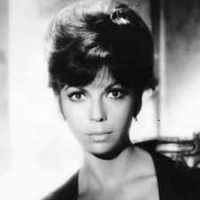
Nancy Sandra Sinatra (born June 8, 1940) is an American singer and actress. She is the elder daughter of Frank Sinatra and Nancy Sinatra (née Barbato), and is widely known for her 1965 signature hit "These Boots Are Made for Walkin'".Other defining recordings include "Sugar Town", the 1967 number one "Somethin' Stupid" (a duet with her father), the title song from the James Bond film You Only Live Twice, several collaborations with Lee Hazlewood, such as "Jackson", "Summer Wine" and her cover of Cher's "Bang Bang (My Baby Shot Me Down)".
Carole King
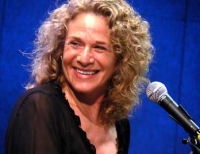
Carole King (born February 9, 1942) is an American singer, songwriter, and pianist. She was most active as a singer during the first half of the 1970s, though she was a successful songwriter for considerably longer both before and after this period.
King has won four Grammy Awards and has been inducted into both the Songwriters Hall of Fame and the Rock and Roll Hall of Fame for her songwriting, along with long-time partner Gerry Goffin.
King has won four Grammy Awards and has been inducted into both the Songwriters Hall of Fame and the Rock and Roll Hall of Fame for her songwriting, along with long-time partner Gerry Goffin.
Rent

Rent is a rock musical, with music and lyrics by Jonathan Larson based on Giacomo Puccini's opera La Bohème. It tells the story of a group of impoverished young artists and musicians struggling to survive and create in New York's Lower East Side in the thriving days of the Bohemian East Village, under the shadow of AIDS.
Rent won a Tony Award for Best Musical and a Pulitzer Prize, among other awards. In addition, its cast was unusually ethnically diverse. Rent brought controversial topics to a traditionally conservative medium, and it helped to increase the popularity of musical theater amongst the younger generation. "Rent speaks to Generation X the way that the musical Hair spoke to the baby boomers or those who grew up in the 1960s, calling it "a rock opera for our time, a Hair for the 90s."
The musical was first seen at the New York Theatre Workshop in 1994. On January 26, 1996, Rent opened in New York City off-Broadway before moving to Broadway's Nederlander Theatre on April 29, 1996. Rent has been successful on Broadway, where it had critical acclaim and word-of-mouth popularity. The Broadway production of Rent closed on September 7, 2008 after a 12 year run and 5,124 performances, making it the seventh-longest-running Broadway show. The production has grossed over $280 million. At the time of its closing, it was the second-longest-running musical currently on Broadway, eight years behind The Phantom of the Opera.
Rent won a Tony Award for Best Musical and a Pulitzer Prize, among other awards. In addition, its cast was unusually ethnically diverse. Rent brought controversial topics to a traditionally conservative medium, and it helped to increase the popularity of musical theater amongst the younger generation. "Rent speaks to Generation X the way that the musical Hair spoke to the baby boomers or those who grew up in the 1960s, calling it "a rock opera for our time, a Hair for the 90s."
The musical was first seen at the New York Theatre Workshop in 1994. On January 26, 1996, Rent opened in New York City off-Broadway before moving to Broadway's Nederlander Theatre on April 29, 1996. Rent has been successful on Broadway, where it had critical acclaim and word-of-mouth popularity. The Broadway production of Rent closed on September 7, 2008 after a 12 year run and 5,124 performances, making it the seventh-longest-running Broadway show. The production has grossed over $280 million. At the time of its closing, it was the second-longest-running musical currently on Broadway, eight years behind The Phantom of the Opera.
Billy Joel

William Martin Joel (born May 9, 1949) is an American pianist and singer-songwriter. He released his first hit song, "Piano Man", in 1973. According to the RIAA, he is the sixth best-selling recording artist in the United States.
Joel had Top 10 hits in the '70s, '80s, and '90s; is a six-time Grammy Award winner, and has sold in excess of 150 million albums worldwide. He was inducted into the Songwriter's Hall of Fame (Class of 1992), the Rock and Roll Hall of Fame (Class of 1999), and the Long Island Music Hall of Fame (Class of 2006). Joel "retired" from recording pop music in 1993 but continued to tour (sometimes with Elton John). In 2001 he subsequently released Fantasies & Delusions, a CD of classical compositions for piano. In 2007 he returned to recording with a single entitled "All My Life," followed by an extensive "World Tour" from 2006-2008, covering many of the major world cities.
Joel had Top 10 hits in the '70s, '80s, and '90s; is a six-time Grammy Award winner, and has sold in excess of 150 million albums worldwide. He was inducted into the Songwriter's Hall of Fame (Class of 1992), the Rock and Roll Hall of Fame (Class of 1999), and the Long Island Music Hall of Fame (Class of 2006). Joel "retired" from recording pop music in 1993 but continued to tour (sometimes with Elton John). In 2001 he subsequently released Fantasies & Delusions, a CD of classical compositions for piano. In 2007 he returned to recording with a single entitled "All My Life," followed by an extensive "World Tour" from 2006-2008, covering many of the major world cities.
Jason Robert Brown
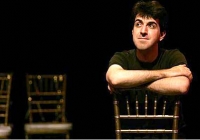
Jason Robert Brown (born 1970 in Ossining, New York) is an American musical theater composer and lyricist. Often cited as one of the "New School" of theatrical composers (a list that includes Michael John LaChiusa, Adam Guettel, Andrew Lippa, and Jeanine Tesori, among others), Brown's music sensibility fuses pop-rock stylings with theatrical lyrics. An accomplished pianist, Brown has often served as music director, conductor, orchestrator and pianist for his own productions.
Giulio Caccini
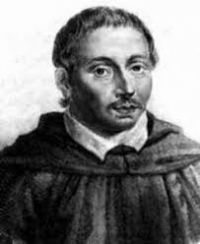
Giulio Romolo Caccini (also Giulio Romano) (Rome, 8 October 1551 – Florence, buried 10 December 1618) was an Italian composer, teacher, singer, instrumentalist and writer of the late Renaissance and early Baroque eras. He was one of the founders of the genre of opera, and one of the most influential creators of the new Baroque style. He was also the father of the composer Francesca Caccini and the singer Settimia Caccini.
Lars Winnerbäck

Lars Mattias Winnerbäck (born 19 October 1975 in Stockholm) is a Swedish singer and songwriter. He was born in Stockholm but spent his childhood in Vidingsjö, Linköping, where he attended Katedralskolan. He moved back to Stockholm in 1996, the same year he released his first album, Dans med svåra steg. He is now one of Sweden's most popular artists.The influence of songwriters like Carl Michael Bellman, Evert Taube, Bob Dylan, Ulf Lundell and Cornelis Vreeswijk shines through in Winnerbäck's exclusively Swedish lyrics, which deal with shallowness, prejudice in society, as well as romance, relationships and anxiety. Several songs depict the difference between living in small town Linköping and the capital Stockholm.
Walt disney
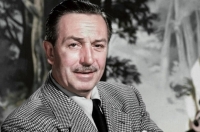
Walter Elias Disney (/ˈdɪzni/; December 5, 1901 – December 15, 1966) was an American entrepreneur, animator, voice actor and film producer. A pioneer of the American animation industry, he introduced several developments in the production of cartoons. As a film producer, Disney holds the record for most Academy Awards earned by an individual, having won 22 Oscars from 59 nominations. He was presented with two Golden Globe Special Achievement Awards and an Emmy Award, among other honors. Several of his films are included in the National Film Registry by the Library of Congress.
 Daily Sheet Music is a web site for those who wants to access popular sheet music easily,
letting them download the sheet music for free for trial purposes.
It's completely free to download and try the listed sheet music, but you have to delete the files after 24 hours of trial period.
Don't forget, if you like the piece of music you have just learned playing,
treat the artist with respect, and go buy the original sheet music.
Daily Sheet Music is a web site for those who wants to access popular sheet music easily,
letting them download the sheet music for free for trial purposes.
It's completely free to download and try the listed sheet music, but you have to delete the files after 24 hours of trial period.
Don't forget, if you like the piece of music you have just learned playing,
treat the artist with respect, and go buy the original sheet music.
